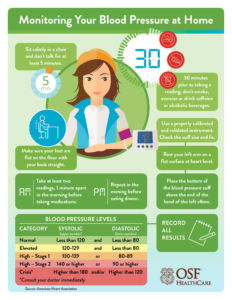
Tips for monitoring your blood pressure at home
Checking your blood pressure at home doesn’t replace going to the doctor. But because people are generally more relaxed at home than at the doctor’s office, their blood pressure may be lower at home.
Monitoring your blood pressure at home – especially if you’ve been diagnosed with high blood pressure – gives you an opportunity to stay on top of your condition and know when it may be time to call your doctor, according to Melinda Cooling, APRN, who is vice president of Advanced Practice and chief clinician executive for OSF OnCall.
“It’s an opportunity for both your primary care provider and yourself to get a look at how your blood pressure changes throughout the day and what your trends are,” Melinda said. “Trends in your blood pressure are the most critical decision point for a health care provider.”
While monitoring your blood pressure at home helps in tracking your treatment, it also encourages you to have better control over your condition.
“You can gain a stronger sense of responsibility for your health by monitoring your blood pressure at home,” Melinda said. “It could motivate you to properly take any medication you’ve been prescribed, become more physically active and follow a healthier diet.”
Types of monitors
There are two types of blood pressure monitors you can consider for use at home. They are:
- Aneroid – These monitors have a cuff that you inflate and a dial gauge to read. While these types of monitors are inexpensive, they can be hard to read properly. They also should be adjusted, or calibrated at least once a year.
- Digital – Easy to use and read, most digital monitors can be used with one hand. They are sensitive to the movement of the body. Operated on batteries, these monitors can be a little more expensive.
Melinda recommends talking to your provider to determine the best type of monitor you need to track and control your hypertension.
“You should also bring the monitor with you to your provider’s office to compare it with what is used in the office,” she said. “This will give you a better idea of the accuracy of the reading you get while at home versus in the doctor’s office.”
Tips for buying a monitor
The American Heart Association (AHA) recommends using an automatic monitor with a cuff that goes on your upper arm (bicep).
Other things to consider:
- The AHA doesn’t recommend wrist and finger monitors because the results aren’t as reliable as the upper arm monitors.
- Make sure the monitor meets the S. Blood Pressure Validated Device Listing (VDL) criteria.
- The monitor should be approved for use on children, pregnant women and older adults, depending on whom it will be used.
- Make sure the cuff is the correct size. People with smaller or larger arms may need a special cuff.
- Check your monitor’s reading when the device is new by comparing its reading to the one used at your doctor’s office.
- Check your monitor once a year as they can wear out over time.
Track your blood pressure readings
It’s helpful to take readings at the same time of day each day – or however often your doctor recommends – and keep those readings in a log.
“You can then share those readings with your doctor and together you can discuss any changes or further explore what you’re doing in terms of your lifestyle that may be resulting in inconsistent readings,” Melinda said. “If you have high readings for a couple days in a row, it’s very important to contact your doctor immediately.”
